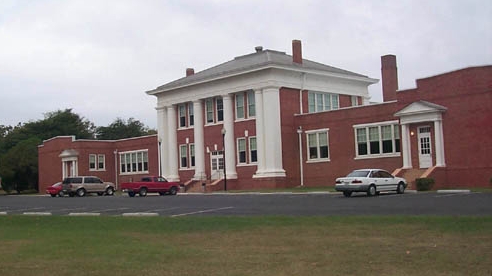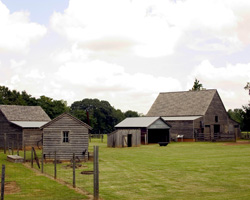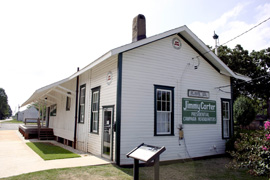Day Trip to Jimmy Carter National Historic Site
Guest blog by Ruchi Garg
A little over an hour from Columbus is Plains, Georgia, the hometown of the 39th President of United States and Nobel Peace Prize Laureate, Jimmy Carter. As mentioned at the National Park Services website:
A visit to the site provides an opportunity to explore the historic resources and rural southern culture that had an influence in molding the character and political policies of Jimmy Carter.
The site includes the following:
The Plains High School
The Plains High School serves as the Park Museum and Visitor Center. There is a 25-minute video about the life and accomplishments of Jimmy Carter. At the restored and furnished classrooms, the visitors can learn about the Carter’s lives in Plains.
The Carter Boyhood Farm
The National Park provides a guided tour of the Farm on weekends, free of charge, twice a day. I attended the guided tour with my family, and I would definitely recommend it.
The park ranger started at the entrance of the Farm and showed us the outdoor classroom, where the National Park conducts summer camps and other events throughout the year.
The farm is lined by Pecan trees, grown by President Carter’s mom, Mrs. Lilian Gordy Carter. She was a nurse and to make some extra money, she planted the pecan trees. Jimmy and his father, Mr. James Earl Carter Sr., would help her shell them and then the family would sell the pecans in their family-owned Country store. Surprisingly, the money earned from the sale of pecans during those two months.
Our next stop was the family home. There were fig trees at the entrance of the house. The park ranger explained to us that back in those days, all the fruits and vegetables had to be grown in your own backyard. There were peach trees and cane sugar, among other trees.
As we entered the family home, we saw the old fashioned butter churner. The next stop was the laundry room. There were buckets and an old fashioned clothes scrubber, which resembled a big mandoline. The park ranger had a clothes-washing station in the backyard, with a bucket full of water, soap bar and clothes scrubber for the kids to try their hand at washing clothes the old fashioned way. It was a wonderful hands-on experience to learn about life in the bygone era.
Next, we saw Jimmy Carter’s bedroom and learned about his love for books. His uncle was in the United States Navy and would send him postcards from around the world. This greatly influenced Jimmy and as he grew up, he decided to go to Naval Academy.
The park ranger showed us how the old fashioned telephone worked. Back in those days, to make a call, one had to call the operator and then the operator would call the number and then connect the telephone line. Jimmy Carter loved listening to the radio and so each night he would use the car battery to run the radio.
There was no running water and heating when the Carters first moved into the house. The woodstove provided heating for the house and the Carters had to fill buckets from the well. When the Carters finally had running water, it was provided by the water tank on the windmill. No one complained about taking a bath in cold water even in dead winter months.
There are rail tracks close to the backyard of the house. There is an interesting story about how when the Carter kids had friends for a sleepover, the friends would be up in the middle of the night due to the loud sound of the whistle, but the Carter’s would sleep through.
We then explored the family-owned country store. Mr. James Earl Carter Sr. was an enterprising businessman. There is a funny incident about when one year, Mr. Thomas Carter grew lots of tomatoes and bottled them up as ketchup for sale in the store. One fine morning, everyone heard gunfire in the store and it turned out to be ketchup bottles, as the ketchup had become fermented and hence the bottles were bursting in the store. The store also housed a chicken plucker. When Jimmy Carter was young, he spent a lot of time with the farm caretaker, an African- American, named Jack Clark and his wife Rachel. Jimmy spent a lot of time at their home, also a part of the Boyhood Farm.
There is a Blacksmith shop at the barn which regularly conducts activities for children.
The farm conducts an annual festival every November when the cane juice is extracted and boiled to make Sorghum syrup.
One of the newest addition is an apiary as a reminder of how Jimmy Carter loved Bee Keeping. Honey was an important source of income (the Carters used to sell honey at the country store) as well as a welcome additive to the family meals.
Peanuts were an important crop grown at the farm and its no wonder that the image of the peanut in caricature was seen around the world as a symbol not only of a president, but also the town of Plains.
After the tour, one cannot help but appreciate how life at the farm greatly influenced Jimmy Carter’s childhood and prepared him for his future as the president of the United States.
The Historic District of Plains
Learn about the interesting history behind the name of Plains. You can find out more at here.
The Plains Train Depot
Jimmy Carter used the Plains train depot as his Presidential Campaign Headquarters beginning in 1975.
The train depot contains a self-guided museum tour with exhibits focussing on the campaign. When you enter the main floor of the depot, you can almost feel the excitement as you listen and explore the campaign.
The Rosalyn Carter Butterfly Trail
There are 8 public butterfly gardens in Plains Historic District due to the efforts of Mrs. Rosalyn Carter, wife of President Jimmy Carter. Her desire to bring awareness about conserving butterflies, their habitat and from her own love of nature resulted in the Butterfly Trail in Plains.
The Carter Private Residence and Compound
Not open the public. President Carter and his wife spend about 85-90% of their time at home in Plains.
What to know if you go:
Location:
Map (html)
The Jimmy Carter National Historic Site is located ten miles west of Americus, Georgia off U.S. HWY.280. Plains High School Museum is the park’s main visitors center. Once you enter Plains turn North on North Bond Street and follow the National Park signs to the school.
Operating Hours:
Open year-round, seven days a week except on Christmas and New Year’s Day. Doors open at 9:00a.m. and close at 5:00p.m. The Boyhood Farm hours are 10:00 AM to 5:00 PM.
Fees:
No fees are charged for visiting the park.
Arranging a school field trip:
For information on schedule a school field trip for your students, click here.






